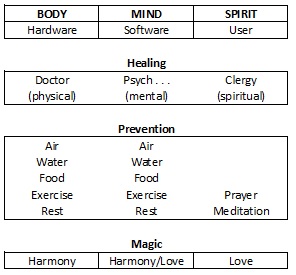In previous issues of Computer Times, we printed a 26-month series from the book titled Get The MOST from Yourself, by Dr. Terry Kibiloski. This is the 12th article of that series.
Creating a Healthy Mind
The human system is similar to the personal computer system, with three major parts – the body (hardware), the mind (software), and the spirit, or soul, (user).
We are spirits having a human experience!
To maintain the human system it’s important to understand:
- Body specialists (doctors) help maintain our human body.
- Mind specialists (psychologists) help maintain our human mind.
- Spirit, or soul, specialists (priests, ministers, rabbis, etc.) teach us how to effectively use our body and mind. The ideal teacher is the Creator of our body and mind.
If you can understand the similarity between the computer system and the human system, you are on your way to getting the MOST from yourself. Let’s now look at some important principles.
- As the computer operator uses the hardware and software to have a computing experience, our spirit uses the body and mind to have a human experience
- Our overall health depends upon a harmonious relationship between our body, mind and spirit
- Our human system seeks harmony and ease, not dis-ease
- We are spirits having a human experience.
Last month, we showed you how to apply the principles of this series to have a healthy body. This month, we focus on having a healthy mind.
In our seminars, we suggest you keep a log of everything you do each day, for a week.
- Using a small pocket tablet, keep track of all the things you do each day for the next seven days. Write down the things you enjoy in the back of the tablet, and the things you do not enjoy in the front. For example, in the back of the tablet you may write down things like pet your cat, talk to your neighbor, hug your spouse, etc. In the front of the tablet you may write things like traffic jams, waiting for a plane, working with a particular coworker, etc. After a week has passed, look carefully at both sides of the tablet. Try to expand those things in your life that you enjoy and reprogram your mind to react differently to the things you do not enjoy.
Let’s take traffic jams as an example. If a traffic jam is a situation in which you get angry, it is because your mind has been programmed that traffic is something that should trigger anger. To change that programming, you simply begin doing something different when you come upon a traffic jam. For example, you could pop in a pleasant audio CD or cassette and sit back and enjoy the music, or listen to a book on tape, or talk to the person in the next car, or use the extra time to mentally plan your day, or pray, or simply relax. There are hundreds of things you can do in a traffic jam.
The main thing to do is something other than getting angry. Though your mind will try to trigger your anger (remember, it is simply following its programming), you need to consciously do something pleasantly different. After a couple of traffic jams of reprogramming, your mind will expect to do something pleasant and traffic jams will no longer be situations where you choose to get angry.
Notice I said “choose” to get angry. Traffic jams cannot cause anger. Only our thoughts can cause anger. As Norman Vincent Peale said,
- Change your thoughts and you change your world.
This can be done for most everything you would like to change in your life, from how you treat traffic jams to how you treat people. While it will not make traffic jams go away, your new positive behavior can have a dramatic influence on you and on changing the behavior of people around you – for the better.
At our seminars, many times we are asked how to have positive thoughts for people who always yell at you. The easiest way I have found to do this is to remember what Zip Ziggler says about people who yell. They are not trying to hurt you, they are hurting inside. When we understand this, it is so much easier to have compassion for them rather than to be angry at them.
It is sad to see people who want desperately to improve their life, but are so filled with blame and bitterness for someone in their past that they find it impossible to fly into the future. As one young lady commented to me, “I can’t stop thinking about what this person did to me. I feel so betrayed. I feel so used.” The sad reality is this person from her past only victimized her for an instant, many years ago, yet she has continued to victimize herself each and every day from that one moment to the present. She has truly been her own worst enemy through the years.
So, remember, when someone strikes out to hurt you, they are truly hurting inside. Have compassion for them, for their inner pain. Bitterness and blame will only burn up precious energy and waste precious time.
Isn’t it time you started changing the world, one person at a time, beginning with YOU? Why not begin right now, with a great big smile for everyone you see.
Send this to everyone you consider a FRIEND.
Much more next month . . . Get the Most from Yourself – Chapter 12
IMPORTANT NOTICE: This file is protected by copyright laws. It may not be copied or reproduced in any way without the expressed permission from the author, Dr. Terry Kibiloski. Readers who purchase a copy of this file from Computer Times, may make a printed copy for their personal use only.


